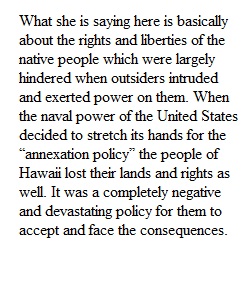


Q IN HER OWN WORDS - THE QUEEN SPEAKS 55 unread replies.55 replies. INTRODUCTION As the last monarch of Hawai'i, Queen Liliuokalani had lived a lifetime of triumphs and struggles. in 1898 she publish a memoir of sorts entitled Hawaii's Story by Hawaii's Queen Here is a link for the complete digital copy of the text: Link to text (Links to an external site.) The reason for this discussion is because in one of the sections toward the end of the text, she denounces the annexation of her native land and writes a very poignant and ominous statement. ... QUEEN'S STATEMENT "...But will it also be thought strange that education and knowledge of the world have enabled us to perceive that as a race we have some special mental and physical requirements not shared by the other races which have come among us? That certain habits and modes of living are better for our health and happiness than others? And that a separate nationality, and a particular form of government, as well as special laws, are, at least for the present, best for us? And these things remained to us, until the pitiless and tireless "annexation policy" was effectively backed by the naval power of the United States. To other usurpations of authority on the part of those whose love for the institutions of their native land we could understand and forgive we had submitted. We had allowed them virtually to give us a constitution, and control the offices of state. Not without protest, indeed; for the usurpation was unrighteous, and cost us much humiliation and distress. But we did not resist it by force. It had not entered into our hearts to believe that these friends and allies from the United States, even with all their foreign affinities, would ever go so far as to absolutely overthrow our form of government, seize our nation by the throat, and pass it over to an alien power. And while we sought by peaceful political means to maintain the dignity of the throne, and to advance national feeling among the native people, we never sought to rob any citizen, wherever born, of either property, franchise, or social standing. Perhaps there is a kind of right, depending upon the precedents of all ages, and known as the "Right of Conquest," under which robbers and marauders may establish themselves in possession of whatsoever they are strong enough to ravish from their fellows. I will not pretend to decide how far civilization and Christian enlightenment have outlawed it. But we have known for many years that our Island monarchy has relied upon the protection always extended to us by the policy and the assured friendship of the great American republic. If we have nourished in our bosom those who have sought our ruin, it has been because they were of the people whom we believed to be our dearest friends and allies. If we did not by force resist their final outrage, it was because we could not do so without striking at the military force of the United States. Whatever constraint the executive of this great country may be under to recognize the present government at Honolulu has been forced upon it by no act of ours, but by the unlawful acts of its own agents. Attempts to repudiate those acts are vain. The conspirators, having actually gained possession of the machinery of government, and the recognition of foreign ministers, refused to surrender their conquest. So it happens that, overawed by the power of the United States to the extent that they can neither themselves throw off the usurpers, nor obtain assistance from other friendly states, the people of the Islands have no voice in determining their future, but are virtually relegated to the condition of the aborigines of the American continent... Is the American Republic of States to degenerate, and become a colonizer and a land-grabber? And is this prospect satisfactory to a people who rely upon self-government for their liberties, and whose guaranty of liberty and autonomy to the whole western hemisphere, the grand Monroe doctrine, appealing to the respect and the sense of justice of the masses of every nation on earth, has made any attack upon it practically impossible to the statesmen and rulers of armed empires? There is little question but that the United States could become a successful rival of the European nations in the race for conquest, and could create a vast military and naval power, if such is its ambition. But is such an ambition laudable? Is such a departure from its established principles patriotic or politic?..." ... DISCUSSION PROMPT I understand the language used is Victorian English and can be a bit "heavy" to read and digest but I am asking you to do just that. 1. I would like you to respond to her statement: what is she saying? what does it mean to you? is anything she writes in 1898 relevant today? 2. After you have written your post you are to reply to at least one of your peers (hopefully more) NOTE: Some of you may be thinking what this has to do with music. I argue that everything the Queen and Hawai'i itself experienced culminated in the music we have today. In order to understand the "why" of music we must first understand the context in which it is created.
View Related Questions